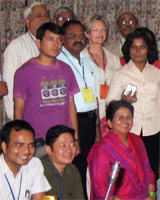South Asian journalists commemorate World Press Freedom Day 2009
13-05-2009 (Kathmandu)

Participants of the conference.
© UNESCO
UNESCO, jointly with the Office of the High Commissioner for Human Rights (OHCHR) and the Federation of Nepali Journalists, convened a regional conference in Kathmandu (Nepal) on 3 and 4 May to observe World Press Freedom Day. Participants from Afghanistan, Bangladesh, Bhutan, India, Maldives, Nepal, Pakistan and Sri Lanka focused on this year’s theme “The Potential of Media in Fostering Dialogue, Mutual Understanding and Reconciliation”.
More than 150 media practitioners from Nepal and other countries of the South Asian region attended the inauguration ceremony, which was opened by Nepal's President, Ram Baran Yadav. Following the screening of a video on the visit of the International Media Mission (IMM) to Nepal in February 2009, during which UNESCO along with other members of the mission expressed deep concern over the deterioration of press freedom in Nepal, the President officially launched the report A call to end violence and impunity, prepared by IMM.
During the discussions and the experience-sharing sessions, South Asian journalists showcased three specific themes of common interest and concern:
The International Federation of Journalists and the South Asia Media Solidarity Network presented their seventh annual South Asia Press Freedom Report, Under Fire: Press Freedom in South Asia 2008-2009. The report reveals a worrying decline in press freedom across the seven countries assessed (Afghanistan, Bangladesh, Bhutan, India, Nepal, Pakistan and Sri Lanka).
In the Declaration on Media Freedom in South Asia, adopted at the closing session, participants emphasized the importance of their solidarity in facing common interests and common media challenges. They stressed the importance of World Press Freedom Day as an opportunity to celebrate the fundamental principles of press freedom, to evaluate press freedom, to defend the media from attacks on their independence and to pay tribute to journalists who have lost their lives in the line of duty.
During the discussions and the experience-sharing sessions, South Asian journalists showcased three specific themes of common interest and concern:
- the limits to press freedom in South Asia,
- the potential of media in fostering dialogue, and
- the role of media in empowering citizens in countries in transition.
The International Federation of Journalists and the South Asia Media Solidarity Network presented their seventh annual South Asia Press Freedom Report, Under Fire: Press Freedom in South Asia 2008-2009. The report reveals a worrying decline in press freedom across the seven countries assessed (Afghanistan, Bangladesh, Bhutan, India, Nepal, Pakistan and Sri Lanka).
In the Declaration on Media Freedom in South Asia, adopted at the closing session, participants emphasized the importance of their solidarity in facing common interests and common media challenges. They stressed the importance of World Press Freedom Day as an opportunity to celebrate the fundamental principles of press freedom, to evaluate press freedom, to defend the media from attacks on their independence and to pay tribute to journalists who have lost their lives in the line of duty.
 Group photo of the participants of the Kathmandu conference.
Group photo of the participants of the Kathmandu conference.© UNESCO
Related themes/countries
· Afghanistan
· Bangladesh
· Bhutan
· India
· Maldives
· Nepal
· Pakistan
· Sri Lanka
· World Press Freedom Day 2009
· Press Freedom: News Archives 2009
Share this story:
Contact information
- UNESCO
Source














